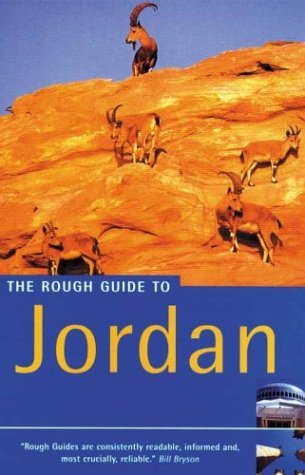The Rough Guide to Jordan - Softcover

Jordan is largely desert, but this one bland word covers a multitude of scenes, from the dramatic red sands and towering cliffs of the far south to the endless stony plains of volcanic basalt in the east. The northern hills, rich with olive trees, teeter over the rift of the Jordan Valley, which in turn runs down to the Dead Sea, lowest point on earth. The centre of the country is carpeted with tranquil fields of wheat, cut through by expansive canyons and bordered by arid, craggy mountains. At the southernmost tip of the country, beaches fringe the warm waters of the Red Sea, which harbours some of the most spectacular coral reefs in the world.
Jordan is part of the land bridge linking Europe, Africa and Asia, and has seen countless armies come and go. Greeks, Romans, Muslims, Christian Crusaders and more have left evidence of their conquests, and there are literally thousands of ruins and archeological sites from all periods in every corner of the country. In addition, Israel and Palestine, Jordan’s neighbours to the west, have no monopoly on biblical history: it was in Jordan that Lot sought refuge from the fire and brimstone of the Lord; Moses, Aaron and John the Baptist all died in Jordan; and Jesus was almost certainly baptized here. Even the Prophet Muhammad passed through.
And yet the country is far from being stuck in the past. Amman is a thoroughly modern capital, and Jordan’s respectable rate of economic growth means that grinding poverty is the rare exception rather than the rule. Kids may sell you cigarettes or offer to shine your shoes, but you’ll see more desperate begging in the streets of any European or North American city than anywhere in Jordan. Government is stable, with leanings towards democracy under a constitutional monarchy, and manages to be simultaneously pro-Western, pro-Arab, founded on a bedrock of Muslim authority and dedicated to ongoing peace with Israel. Women are better integrated into positions of power in government and business than almost anywhere else in the Middle East, military conscription was abolished in 1991, and Jordanians are exceptionally highly educated: just over 2.5 percent of the total population is enrolled at university, a proportion comparable to the UK. Traditions of hospitality are ingrained, and taking up some of the many invitations you’ll get to tea or a meal will expose you to an outlook among local people that is often as cosmopolitan and world-aware as anything at home. Though surrounded by instability, Jordan is the safest country in the Middle East by quite a long way, and domestic extremism is virtually nonexistent.
Most people take great pride in their ancestry, whether they’re present or former desert-dwellers (Bedouin) or from a settled farming tradition (fellaheen). Across the desert areas, people still live and work on their tribal lands, whether together in villages or apart in individual family units; most town-dwellers, including substantial numbers of Ammanis, claim tribal identity. Belonging to a tribe (an honour conferred by birth) means respecting the authority of a communal leader, or sheikh, and living in a culture of shared history, values and principles that often crosses national boundaries. Notions of honour and mutual defence are strong. Tribes also wield a great deal of institutional power: most members of Jordan’s lower house of parliament are elected for their tribal, rather than political, affiliation. The king, as sheikh of sheikhs, commands heartfelt loyalty among many people and deep respect among most of the rest.
National identity is a thorny issue in Jordan, which has been perennially flooded with Palestinian refugees since the foundation of the State of Israel in 1948. Many people from tribes resident east of the River Jordan before 1948 resent this overbalancing of the country’s demography, and the fact that incoming Palestinians, having developed an urbanized, entrepreneurial culture, dominate private-sector business. For their part, Jordanians of Palestinian origin – estimated to make up as much as sixty percent of the population – often resent the "East Bank" Jordanians’ grip on power in government and the public sector. All are Jordanian citizens, but citizenship tends to mean less to many of Palestinian origin than their national identity, and less to many East Bankers than their tribal affiliation. Large numbers of long-stay guest workers from Egypt muddy the issue still further. "Where are you from?" – a simple enough question in most countries – is in Jordan the cue for a life story.
"synopsis" may belong to another edition of this title.
"About this title" may belong to another edition of this title.
- PublisherRough Guides
- Publication date2002
- ISBN 10 1858287405
- ISBN 13 9781858287409
- BindingPaperback
- Edition number2
- Number of pages496
- Rating
Buy New
Learn more about this copy
Shipping:
FREE
Within U.S.A.
Top Search Results from the AbeBooks Marketplace
The Rough Guide to Jordan
Book Description Paperback. Condition: New. Seller Inventory # Abebooks518141

